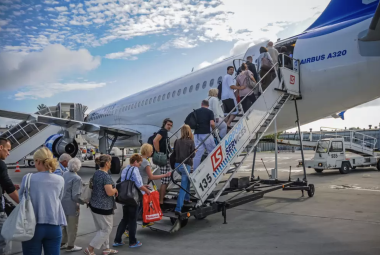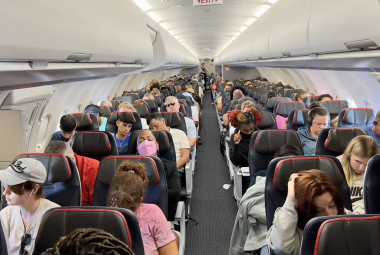Image by left_eye_images
*Vacation Mode is a for-profit site. It contains paid banner advertisements that are generated and managed by a third-party network. This site also includes relevant affiliate links (both in the content and on the sidebar) all of which we do our best to clearly mark as such.
Quick Summary
- Las Vegas Airport, also known as McCarran International Airport, is essential to the local economy, creating jobs, boosting tourism, and supporting various industries.
- The airport has a rich history, with significant expansions including the construction of Terminal 1 in the 1960s and Terminal 3 in 2012, which have enhanced capacity and passenger experience.
- It serves as a gateway for millions, fueling the vibrant tourism industry and stimulating spending across hotels, restaurants, and entertainment venues.
- Las Vegas Airport is a significant employment generator, supporting diverse job roles within the aviation industry and related services, and fueling employment in hospitality, retail, transportation, and logistics.
- The tourism industry, closely tied to the airport, drives economic growth by attracting millions of visitors annually, bolstering revenue for local businesses and fueling job creation.
- Several major industries, including hospitality, business development, and leisure activities, rely on the airport for efficient air travel connections.
- Revenue generation at the airport comes from various sources, including parking fees, airline fees, concessions, rental revenues, advertising partnerships, and real estate development, contributing to ongoing infrastructure enhancements and economic sustainability.
- The airport significantly contributes to the local economy by fostering business development, attracting investments, and supporting local enterprises, creating a symbiotic relationship that enhances regional economic growth and prosperity.
- Local businesses benefit from increased foot traffic, enhanced visibility, and access to employment opportunities, leading to increased revenue streams and a competitive edge in the market.
- The presence of the airport impacts the local real estate market, driving growth, property development, and investment opportunities.
- Las Vegas Airport faces economic challenges, including fluctuating passenger volumes and global economic uncertainties, necessitating strategic planning and innovation.
- The pandemic has significantly impacted the airport's economic stimulus, leading to disruptions in passenger traffic, revenue streams, and operational activities.
- To overcome these challenges, the airport is focusing on economic diversification, enhancing operational efficiency, and fostering innovation in air service offerings.
- The economic impact of Las Vegas Airport is significant, with an annual economic contribution of over $30 billion, supporting over 200,000 jobs and generating substantial tax revenue, making it one of the top economic drivers in Nevada.
Las Vegas Airport, also known as McCarran International Airport, plays a crucial role in the local economy. From creating jobs to boosting tourism and supporting various industries, the airport is a key driver of economic growth in the region.
We will explore the history of the airport, the economic impact of Las Vegas Airport, revenue generation, contribution to the local economy, and the challenges it faces, including the impact of the pandemic.
Join us as we dive into the economic significance of Las Vegas Airport.
History of Las Vegas Airport
Las Vegas Airport, also known as McCarran International Airport, has a rich history dating back to its establishment as a vital transportation hub for the region, playing a pivotal role in shaping the city's infrastructure and contributing to regional development.
Over the years, Las Vegas Airport has undergone significant expansions and modernizations to meet the increasing demands of travelers and accommodate the city's growth. Notable milestones include the construction of Terminal 1 in the 1960s and the addition of Terminal 3 in 2012. These expansions not only enhanced the airport's capacity but also improved passenger experience with state-of-the-art facilities. The airport's strategic location and efficient operations have made it a key driver of economic development in the region, attracting businesses and fostering connectivity.
Economic Impact of Las Vegas Airport
The economic impact of Las Vegas Airport extends far beyond its runways, making significant contributions to the local economy through thriving tourism, robust revenue generation, and sustainable growth that drives economic prosperity in the region.
As one of the busiest airports in the United States, Las Vegas Airport serves as a gateway for millions of visitors each year, fueling the city's vibrant tourism industry. The influx of tourists not only boosts revenue for airlines and airport services but also stimulates spending in hotels, restaurants, and entertainment venues throughout the area. This symbiotic relationship between the airport, tourism, and local businesses creates a cycle of economic activity that fosters job creation, infrastructure development, and overall economic resilience.
How Many Jobs Does The Airport Create?
Las Vegas Airport serves as a significant employment generator, creating a substantial number of jobs that offer diverse employment opportunities across various sectors within the aviation industry and its related services.
The airport's operations support a wide range of job roles such as pilots, cabin crew, air traffic controllers, airport security personnel, maintenance technicians, customer service representatives, and administrative staff.
Airport operations fuel employment in sectors like hospitality, retail, transportation, and logistics, as they cater to the needs of travelers passing through the airport. The job creation facilitated by Las Vegas Airport extends beyond direct employment, with multiplier effects seen in the local economy through increased demand for goods and services.
What Is The Tourism Industry's Contribution To The Economy?
The tourism industry, closely intertwined with Las Vegas Airport, plays a pivotal role in driving economic growth and prosperity by making substantial contributions to the economy through increased travel demand, hospitality sector development, and financial benefits that strengthen the region's economic landscape.
By attracting millions of visitors annually, Las Vegas Airport serves as a bustling gateway for tourists looking to explore the vibrant entertainment scene, luxurious accommodations, and world-class dining options that the city has to offer.
This influx of travelers not only bolsters the revenue streams of local businesses but also fuels job creation in sectors ranging from hotels and restaurants to transportation and entertainment services.
Such economic activity is fundamental in sustaining a robust economy and fostering a thriving community within the Las Vegas metropolitan area.
What Are The Major Industries That Rely On The Airport?
Las Vegas Airport serves as a critical lifeline for several major industries that rely on efficient air travel connections, such as the hospitality sector, business development enterprises, and leisure activities providers, contributing to economic diversification and sustainable growth in the region.
The hospitality sector, for instance, heavily depends on the airport to cater to the constant influx of tourists and business travelers seeking accommodations and entertainment offerings. Business development enterprises leverage the airport's connectivity to foster partnerships, attend conferences, and expand their reach globally, driving innovation and economic progress.
In addition, leisure activities providers heavily rely on the airport to facilitate seamless travel experiences for their clientele, boosting tourism revenues and sustaining local businesses in the process.
How Does The Airport Generate Revenue?
Las Vegas Airport strategically generates revenue through a myriad of sources, leveraging its position as a crucial aviation hub to secure financial benefits that support ongoing infrastructure enhancements, operational efficiency, and economic sustainability.
This approach encompasses a variety of income streams, including parking fees, airline fees, concessions, and rental revenues, ensuring a steady flow of financial resources. The airport also capitalizes on non-aeronautical revenue streams like advertising partnerships and real estate development. By diversifying its revenue sources, Las Vegas Airport mitigates financial risks and maximizes profitability, enabling continuous investments in modernizing facilities, enhancing customer experience, and adopting new technologies. This strategic use of revenue underscores the airport's commitment to sustained growth and long-term success in the dynamic aviation industry.
What Are The Sources Of Revenue For The Airport?
Las Vegas Airport derives revenue from various sources, including airline operations, commercial flights, and passenger services, leveraging its strategic partnerships and operational efficiency to maximize income streams that sustain its economic vitality.
The primary revenue sources for the airport are diversified, with significant contributions coming from the airline industry through landing fees, gate rentals, and passenger facility charges. Commercial flight operations also play a crucial role in generating revenue, as airlines pay for the use of airport facilities and services.
Passenger services such as parking fees, concessions, and advertising partnerships further add to the income. By continuously optimizing these revenue sources and providing quality services to airlines and passengers, Las Vegas Airport remains a thriving hub of commercial aviation.
How Much Revenue Does The Airport Generate Annually?
Las Vegas Airport's annual revenue reflects a comprehensive economic analysis of its financial performance, showcasing the substantial income generated through aviation activities, passenger traffic, and ancillary services that support its operational efficiency and economic sustainability.
This detailed analysis helps in understanding the diverse revenue streams that contribute to the airport's financial success. By delving into the impacts of passenger traffic on overall income, researchers can evaluate the fluctuations in revenue based on seasonal trends, flight demand, and economic conditions. The economic analysis assists in identifying areas for potential revenue growth, optimizing pricing strategies, and enhancing the overall financial stability of Las Vegas Airport.
How Does The Airport Contribute To The Local Economy?
Las Vegas Airport significantly contributes to the local economy by fostering business development opportunities, attracting investments, and supporting local enterprises that benefit from the airport's operations, creating a symbiotic relationship that enhances economic growth and prosperity in the region.
The airport's presence serves as a catalyst for various industries to flourish around it, from hotels and restaurants to transportation services and entertainment venues. By acting as a gateway for travelers and businesses, Las Vegas Airport fuels tourism and trade, injecting capital into the local economy. This not only boosts revenue streams for existing businesses but also encourages entrepreneurs to establish new ventures, capitalizing on the continuous flow of visitors and goods passing through the airport.
What Are The Benefits For Local Businesses?
Local businesses in the vicinity of Las Vegas Airport enjoy a myriad of benefits, including increased foot traffic, enhanced visibility, and access to employment opportunities, creating a conducive environment for growth, innovation, and economic sustainability.
The proximity to the airport not only allows these businesses to tap into a diverse customer base comprising of tourists, business travelers, and airport employees but also fosters networking opportunities and collaborations. Being situated near the airport facilitates easy access to goods and services, promoting convenience for both customers and suppliers. Local businesses in this area benefit from the economic advantages of being part of a bustling travel hub, leading to increased revenue streams and competitive edge in the market.
How Does The Airport Impact The Real Estate Market?
Las Vegas Airport's presence exerts a tangible impact on the local real estate market, driving economic growth, property development, and investment opportunities that stem from the airport's influence on the region's infrastructure and economic landscape.
The continuous expansion and development of Las Vegas Airport act as a catalyst for a multitude of real estate projects, ranging from residential to commercial properties. As the airport attracts more visitors and businesses to the area, the demand for housing, office spaces, and retail establishments increases, prompting a surge in construction activities. This surge not only creates job opportunities but also enhances the overall appeal of the surrounding neighborhoods, thereby boosting property values and fostering a thriving real estate market.
The airport's strategic location and transport links further contribute to the buoyancy of the real estate market, making it an attractive hub for investors seeking promising returns in a dynamic economic environment.
What Are The Economic Challenges Faced By The Airport?
Las Vegas Airport encounters various economic challenges that impact its operations and future economic outlook, requiring strategic planning, risk management, and innovative solutions to navigate through evolving trends and dynamic market conditions.
These economic challenges present significant implications on the airport's economic resilience, highlighting the need for proactive measures to ensure long-term sustainability. Factors such as fluctuating passenger volumes, changing consumer preferences, and global economic uncertainties add complexity to the airport's operational landscape. To address these challenges effectively, Las Vegas Airport must focus on fostering strong partnerships with airlines, optimizing revenue streams, and investing in infrastructure upgrades to enhance service quality and maintain competitiveness in the aviation industry.
How Has The Pandemic Affected The Airport's Economic Impact?
The global pandemic has profoundly impacted Las Vegas Airport's economic stimulus, leading to unprecedented disruptions in passenger traffic, revenue streams, and operational activities, necessitating adaptive measures and recovery strategies to mitigate the economic fallout and foster resilience.
As the pandemic swept across the world, Las Vegas Airport was forced to grapple with a sharp decline in travel demand, triggering a domino effect on its financial health. With borders closed, flights grounded, and strict travel restrictions in place, the airport faced a bleak outlook for the foreseeable future.
To combat these challenges, the airport management swiftly implemented cost-cutting measures, restructured operations, and explored innovative ways to generate revenue. Despite the hurdles, Las Vegas Airport remains determined to bounce back and chart a path towards recovery post-pandemic.
What Are The Plans To Overcome These Challenges?
Las Vegas Airport has devised strategic plans to overcome economic challenges by promoting economic diversification, enhancing operational efficiency, and fostering innovation in air service offerings that align with evolving market demands, ensuring sustained growth and resilience.
These initiatives include partnering with regional economic development organizations to attract new business opportunities, investing in improving airport infrastructure to accommodate increased passenger traffic and streamline operations, and leveraging advanced technology solutions to enhance the overall passenger experience. By focusing on economic diversification, operational enhancements, and innovative air service offerings, Las Vegas Airport aims to establish itself as a competitive hub that drives economic growth and prosperity in the region.
Frequently Asked Questions
What is the economic impact of Las Vegas Airport?
The economic impact of Las Vegas Airport is significant, as it serves as a major transportation hub for the city and a gateway to the famous Las Vegas Strip.
How does Las Vegas Airport contribute to the economy?
Las Vegas Airport contributes to the economy by generating jobs, promoting tourism, and serving as a key link for businesses and industries in the city.
What is the annual economic impact of Las Vegas Airport?
According to recent studies, Las Vegas Airport has an annual economic impact of over $30 billion, making it one of the top economic drivers in the state of Nevada.
How does Las Vegas Airport support local businesses?
Las Vegas Airport supports local businesses by providing a constant stream of travelers who are potential customers, as well as through partnerships and contracts with local vendors and suppliers.
What are some specific examples of the economic impact of Las Vegas Airport?
Some specific examples of the economic impact of Las Vegas Airport include the creation of over 200,000 jobs, the generation of billions of dollars in tax revenue, and the support of industries such as hospitality, entertainment, and transportation.
How does Las Vegas Airport compare to other airports in terms of economic impact?
Las Vegas Airport ranks as one of the top airports in the United States in terms of economic impact, and it consistently ranks among the busiest and most profitable airports in the world.


















